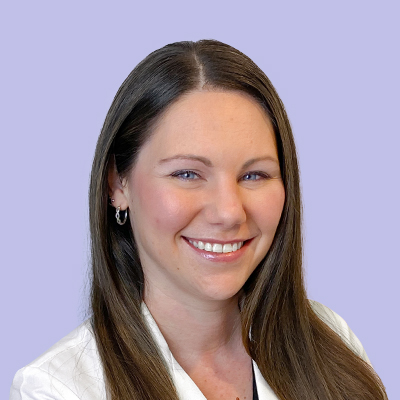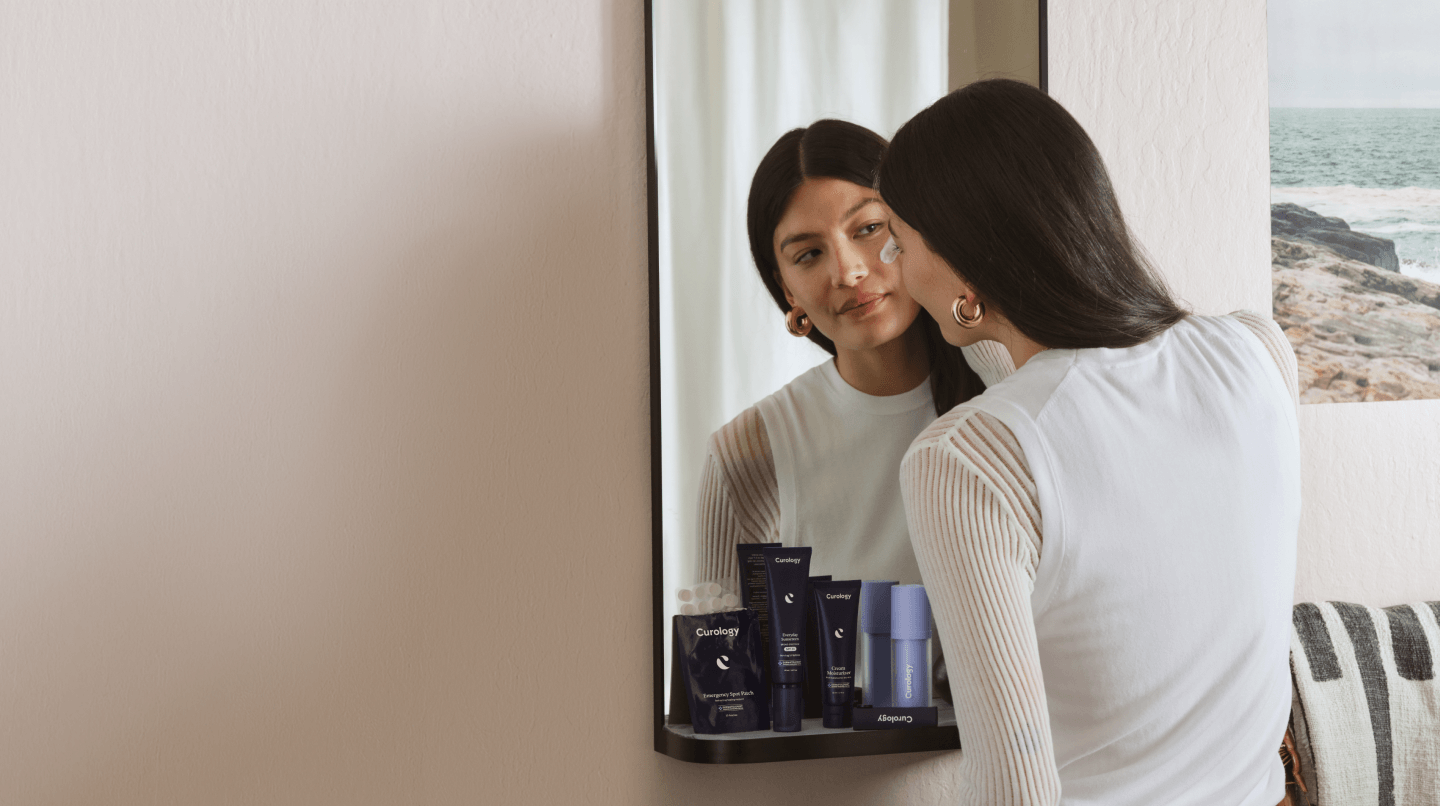How it works:
Share your skin goals and snap selfies
Your dermatology provider prescribes your formula
Apply nightly for happy, healthy skin
How it works:
How it works:
Share your skin goals and snap selfies
Your dermatology provider prescribes your formula
Apply nightly for happy, healthy skin
How it works:
How to boost firmness with anti-aging skincare products
If you want to have healthy, beautiful skin at every age, these products and lifestyle habits can help.



Aging is a gift. As you grow older, you get to experience more and gain priceless pieces of wisdom. With that, your appearance changes, too—which is something you may or may not have mixed feelings about.
To be clear: Signs of aging like fine lines and wrinkles are absolutely nothing to dread or be embarrassed about. When it comes to skincare, we believe your routine should help you to feel confident in your own skin. If for you, that means prioritizing anti-aging skincare, there are definitely treatments and steps you can take to help improve skin texture and boost skin firmness. After all, you can have healthier-looking skin no matter your age. Before we dive into those tactics, let’s talk a bit about how your skin maintains its firmness in the first place.
Collagen and elastin: Keeping skin tight
Collagen and elastin help create the structure of your skin. Collagen is a protein with a fiber-like formation that makes up about 75% of your skin’s dry weight. It contributes to your skin’s strength and stretchiness. Elastin gives your skin elasticity (hence its name!).¹ Elastin fibers allow the skin to bounce back after it’s been stretched, whether during a yoga session or after a really nice, long yawn. The two work as a team to keep your skin looking taut and firm—two traits often associated with the appearance of youthful skin.
6 possible reasons for loose skin
Skin aging is divided into two categories: intrinsic and extrinsic. Intrinsic aging is the natural aging process involving the passage of years and genetic factors that are not under your control. Extrinsic aging is caused by factors you actually can control, like diet, smoking, sun exposure, and stress management.² Let’s look at some examples of each:
Intrinsic factors for aging skin
Changes in metabolism and hormones happen as we age. Our metabolism slows down, and the rate at which the body produces certain hormones like testosterone, estrogen, and progesterone also decreases.
Loss of collagen and elastin is part of the natural aging process.
Extrinsic factors for aging skin
Smoking is a big factor that contributes to wrinkles and loose skin. In fact, it’s been shown to have an even greater impact on wrinkle formation than UV rays.
UV light (sun exposure) is one of the top contributors to loose skin. UV rays increase free radicals, which damage the skin and lead to signs of aging.³
Sleep deprivation can have a negative effect on the skin. Poor sleep quality can increase the signs of aging, such as fine lines, uneven skin tone, and reduced skin elasticity.⁴ By minimizing sleep disturbance, you can help slow down factors that are part of the natural aging process.
Stress has been identified as a possible contributor to aging skin through increased inflammation and levels of stress hormones that can damage DNA in the skin.
How to boost firmness in your skin
To make noticeable improvements to sagging skin and volume loss, you often have to go through in-office procedures (e.g., fillers and injectables, laser treatments, resurfacing, microdermabrasion, chemical peels, Botox, etc.). There’s no judgment if you opt to have in-office cosmetic dermatology treatments. Still, there are other options to help increase cell turnover and boost collagen production. They’re generally more cost-effective and have lower associated risks. If you’re looking for how to increase elasticity in the skin naturally, it’s all about multitasking anti-aging ingredients. Here’s what we mean:
Wear sunscreen daily. The sun’s UV rays are estimated to be responsible for up to 90% of visible aging, especially in those with lighter skin tones.⁵ Enough said.
Use a topical retinoid. Tretinoin is a prescription retinoid and one of our favorite ingredients for minimizing the signs of aging. However, you can also purchase non-prescription retinoids (like retinol) over the counter. Retinoids (including tretinoin) are vitamin A derivatives that accelerate skin cell turnover.⁶ Cell turnover slows down as we age, so giving cell turnover a boost can help decrease the signs of aging by exposing fresh, new skin.
Apply antioxidants. Use serums with antioxidants for added skincare benefits. Vitamin C serums pack a powerful antioxidant punch and contribute to collagen production.⁷ Any one of these serums can make a great addition to your skincare routine.
Moisturize. Not all moisturizers are created equally. The moisturizer by Curology uses hyaluronic acid to help your skin retain its natural moisture. Another ingredient to look for is niacinamide, which is an antioxidant with moisture-preserving properties. Niacinamide also has proven abilities to reduce fine lines and wrinkles.⁸
Try facial exercises. Despite what you might hear on TikTok or YouTube, there’s no substantial evidence to support that facial exercises turn back the clock. But there’s also no harm in giving it a try if you want to! We’ve found that simple exercises and gua sha massage can relieve muscle tension.
Keep it tight, keep it going!
We can’t turn back the clock of time—but even if you could, honestly, would you really want to? Going back to 17 might make for a great rom-com, but in real life, probably not so much. Whether you’re 17 or 70, caring for your skin so it’s as healthy as it can be is important. It’s our protective layer between our inside world and the outside environment, so maintaining its vibrancy is more important than reducing the wrinkles of time.
You can help your skin keep its firmness and elasticity longer by making a few changes in your life—your future self will thank you.
Get a good night’s sleep. We touched on this one already! Not only is sleep important to maintain your skin’s health, but it’s also essential for your overall physical and mental health.
Lather up with SPF 30+. Protect yourself from excessive sunlight exposure. Use a broad spectrum sunscreen daily, and reapply throughout the day. (Psst—the sunscreen by Curology is a 100% mineral sunscreen with SPF 30 that you’ll actually enjoy wearing.) Wear sun-protective clothing, seek shade, and avoid the sun during peak hours (10 am-2 pm).
Curb your stress. Find ways to manage your stress. Stress can increase inflammation and decrease the integrity of the skin. Meditation, mindfulness, and yoga are all great stress management techniques. So is going for a walk.
Drink water. Dehydration has a harmful effect on your body,⁹ but hydration hasn’t been shown to directly improve your skin’s appearance. Our bodies function best when we’re hydrated, but you’ll still want topical moisturizers to help improve skin barrier function and the look and feel of your skin.
Eat fresh. We’re not talking about miracle foods to improve the elasticity of skin—they don’t exist. But a well-balanced diet with lots of fresh fruit and vegetables may help slow skin aging, and the same goes for cutting back on sugar. High sugar intake can increase glycation end products, or AGEs, which can lead to functional and structural damage to the skin.¹⁰
Quit smoking. Along with all the other proven health risks, smoking also accelerates the skin’s aging process. Smoking has been associated with crow’s feet, under-eye puffiness, reduced lip fullness, and wrinkles (just to name a few!).¹¹
Skincare is a journey!

Our skin is constantly changing as we ebb and flow through life, and it’s vital that we take good care of it. Aging is an inevitable part of life, and it’s one that we think is beautiful! Still, there are several ways to help preserve your skin's natural firmness and elasticity, so it looks and feels young and healthy well into your mature years.
Treat signs of aging with custom skincare
Your skincare routine should help bring out your natural glow—making you feel confident no matter what age or life stage. Curology was founded in 2014 by Dr. David Lorschter, MD, and his mom, Dr. Nancy Satur, MD, board-certified dermatologists. You tell us about your skin, and one of our licensed dermatology providers will consult with you about your skincare routine and prescribe a personalized prescription formula with a mix of three active ingredients for your unique skin and skincare goals (like reducing early signs of aging).
Get your personalized skincare routine with Curology
Get your personalized skincare routine with Curology


We also have a full line of skincare products to complete your routine, each designed by dermatologists to be non-comedogenic, dye-free, paraben-free, and hypoallergenic—made to keep your skin healthier longer. Interested? You can get a free month of Curology—just pay $5.45 (plus tax) to cover shipping and handling on your first box. After that, you can choose the subscription plan that works for you.
FAQs
To make noticeable improvements to sagging skin and volume loss, you often have to go through in-office procedures, but, there are other options to help increase cell turnover and boost collagen production like wearing sunscreen daily, using a topical retinoid, applying antioxidants, moisturizing, and trying facial exercises.
Collagen and elastin help create the structure of your skin. Collagen is a protein with a fiber-like formation that makes up about 75% of your skin’s dry weight. It contributes to your skin’s strength and stretchiness. Elastin gives your skin elasticity (hence its name!).
Skin aging is divided into two categories: intrinsic and extrinsic. Intrinsic aging is the natural aging process involving the passage of years and genetic factors that are not under your control. Extrinsic aging is caused by factors you actually can control, like diet, smoking, sun exposure, and stress management.
P.S. We did the homework so you don’t have to:
Shin, J.W., et al. Molecular mechanisms of dermal aging and antiaging approaches. International Journal of Molecular Sciences. (2019, April 29).
Farage, M. A., et al. Intrinsic and Extrinsic Factors in Skin Ageing: A Review.International Journal of Cosmetic Science. (2008).
Poljšak, B., et al., Free Radicals and Extrinsic Skin Aging. Dermatology Research and Practice. (2012, February 29).
Chen, Y., et al. Brain-skin connection: Stress, inflammation, and skin aging. Inflammation and Allergy Drug Targets. (June 2014).
Farage, M.A., et al. Intrinsic and extrinsic factors in skin ageing: A review. Ibid.
Baldwin, H. E., et al. 40 years of topical tretinoin use in review. Journal of drugs in dermatology. (2013).
Pullar, J.M., et al. The roles of vitamin C in skin health.Nutrients. (2017, July 10).
Levin, J., et al. How much do we really know about our favorite cosmeceutical ingredients?Journal of Clinical and Aesthetic Dermatology. (February 2010).
Popkin, B.M., et al. Water, hydration, and health. Nutrition Reviews. (2010, August 1).
Danby, F.W., Nutrition and Aging Skin: Sugar and Glycation. Clinics in Dermatology. (2010, July-August).
Goodman, G.D., et al.. Impact of smoking and alcohol use on facial aging in women: Results of a large multinational, multiracial, cross-sectional survey.Journal of Clinical and Aesthetic Dermatology. (August 2019).
* Subject to consultation. Subscription is required. Results may vary.

Curology Team

Kristen Jokela, NP-C
Related Articles
How to optimize your morning routine with DayPrime RxThe science behind real glowing skin: how to shine without shimmer Ask an expert: What are the best skincare ingredients?Keep an eye out for these potential acne-causing ingredients Skin purging vs. breaking outPopular Articles
Ask Curology: Is my cold breaking me out?Slugging: The dermatologist-approved skincare hack going viral on TikTokTretinoin vs retinol: What’s the difference?How to create a self-care routine that actually sticksYour 2023 skincare horoscopeTry prescription skincare
Get routine essentials


Face what’s next with Future-ProofRx
Face what’s next with Future-ProofRx
- Skin texture
- Fine lines
- Wrinkles
- Dark spots
- Dullness
$29.95/month